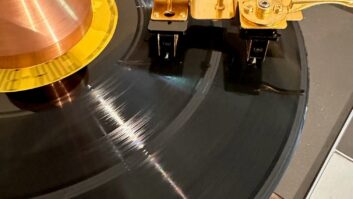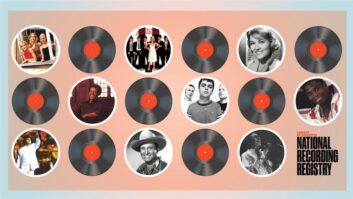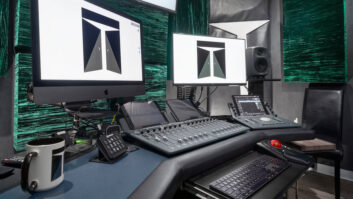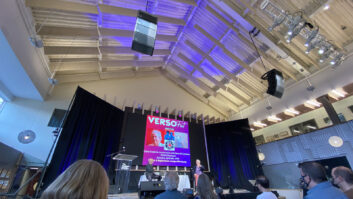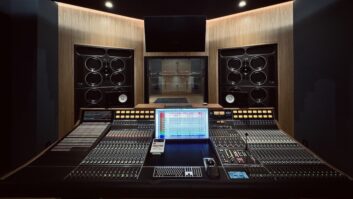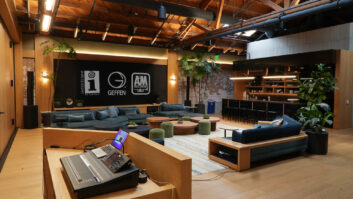Judy Garland, recording for
UMG’s Decca label, circa 1940.Washington, D.C. (January 11, 2011)–Universal Music Group (UMG) has donated more than 200,000 historic master recordings—many long out-of-print or never released—to the Library of Congress’ Recorded Sound Section, which has more than 3 million sound recordings in its collections.

Totaling in excess of 5,000 linear feet, UMG’s gift is the largest single donation ever received by the Library’s audio-visual division and the first major collection of studio master materials ever obtained by the nation’s oldest cultural institution. Among the collection’s thousands of metal and lacquer discs and master mono tapes are released and unreleased versions of recordings by such seminal artists as Louis Armstrong, Bing Crosby, Tommy Dorsey, Billie Holiday, the Andrews Sisters, Connee Boswell, Jimmy Dorsey, the Mills Brothers, Guy Lombardo, Ella Fitzgerald, Fred Waring, Judy Garland, and Dinah Washington, among others.
They include:
• Bing Crosby’s 1947 version of “White Christmas”
• Louis Armstrong singing “Ain’t Misbehavin’”
• The Mills Brothers’ “Paper Doll”
• Ella Fitzgerald’s and Louis Armstrong’s duet “Frim Fram Sauce”
• Les Paul’s “Guitar Boogie”
• Josh White singing “Jim Crow”
• Machito and his Afro-Cuban All Stars Mercury recordings
“It is certainly within the national interest to acquire this recorded collection, and all its accompanying materials, for custodial care,” said Librarian of Congress James H. Billington. “A surprisingly high percentage of America’s recording heritage since the early part of the 20th century has been lost due to neglect and deterioration. The donation of the UMG archive to the Library of Congress is a major gift to the nation that will help maintain the inter-generational connection that is essential to keeping alive, in our collective national memory, the music and sound recordings meaningful to past generations.”
UMG has one of the most extensive catalogs of music in the world and its gift to the Library includes historic masters from such subsidiary labels as Decca, Mercury, Vocalion and Brunswick, dating from the late 1920s through the late 1940s. “Music is a distinctive feature of any historical period, and this particular collection of masters provides true insight into popular music’s humble beginnings and who we are as a culture today,” said Zach Horowitz, UMG’s president and chief operating officer. “We are delighted to be collaborating with the Library of Congress to preserve and call attention to the groundbreaking musical achievements of these amazing musical pioneers.”
The Universal Music Collection, which consists of the company’s best existing copies, will be cataloged and digitized at the Library’s Packard Campus for Audio Visual Conservation in Culpeper, VA. The Packard Campus is a state-of-the-art facility where the nation’s library acquires, preserves and provides access to the collection of films, television programs, radio broadcasts and sound recordings. The Packard Campus is funded as a gift to the nation by the Packard Humanities Institute and is home to more than six million collection items.
“The Packard Campus and its employees will work hard to protect the Library’s comprehensive collection and make these recordings accessible to the American people, and this generous contribution by Universal Music will help preserve our nation’s rich cultural heritage,” said Congressman Eric Cantor, Majority Leader for the 112thCongress and U.S. Representative from the 7th District of Virginia, which includes Culpeper.
According to the Library of Congress, this gift is particularly important in the context of the findings of the first comprehensive, congressionally mandated study ever conducted in the U.S. on a national level. It found that only an estimated 14 percent of pre-1965 commercially released recordings were currently available from rights holders. The study also found that of the music released in the U.S. in the 1930s, only about 10 percent of it could be readily accessed by the public.
The Library will stream recordings from the collection on a website to be launched in the spring. The additions of these recordings will significantly broaden the scope of the site and enhance the Library’s authority to stream commercially owned sound recordings online.
Library of Congress
myloc.gov
Packard Campus
www.loc.gov/avconservation
Universal Music Group
www.universalmusic.com
